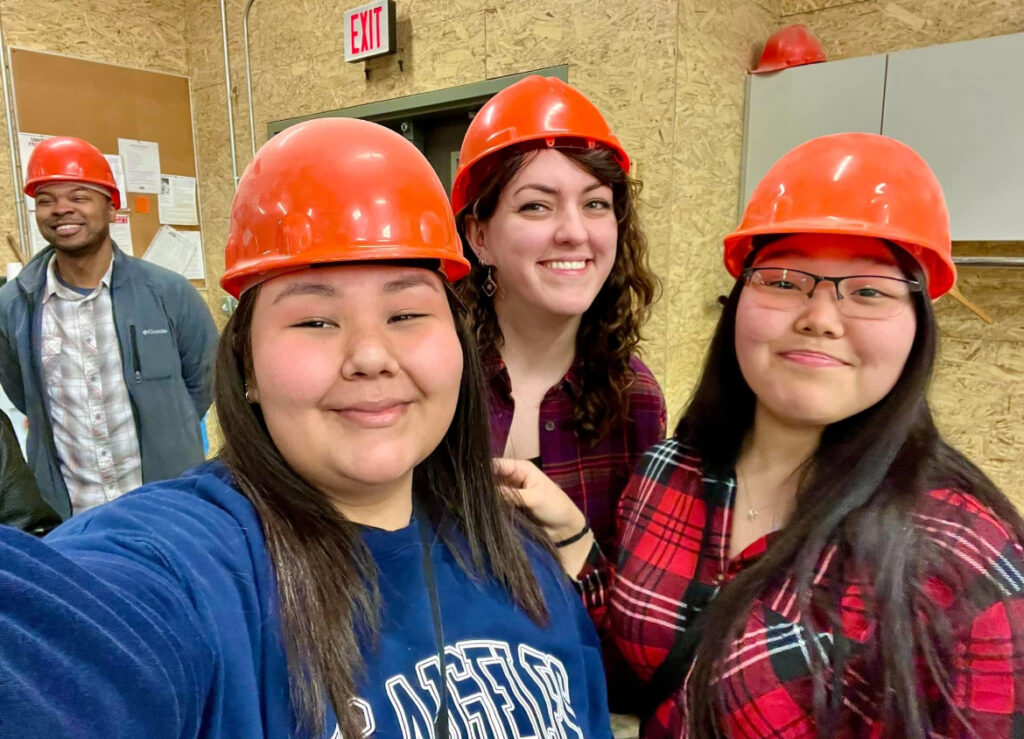Like working with your hands? In the Construction program, you’ll learn the skills to build everything from the ground up. Explore carpentry, framing, blueprint reading, and safe tool use while taking on real projects that make a difference in your community. Whether you’re interested in building homes, working heavy equipment, or exploring project management, this class lays the foundation for a solid future.
Introduction to Electrical Careers: This comprehensive electrical training program combines distance learning with strategic in-person intensive sessions, culminating in IBEW pre-apprentice opportunities. The program is designed to provide students with foundational electrical knowledge through remote instruction while ensuring hands-on experience through three critical in-person weeks.
Intro to Construction Careers: This course provides students with a foundation in construction skills while emphasizing the importance of safety on the job. Following OSHA standards, students will learn how to use and care for personal protective equipment (PPE), operate and maintain common hand and power tools, and apply safe practices on job sites. The course also introduces the basics of reading construction drawings, including key terms, symbols, measurements, and scales. Through a mix of hands-on activities and written assignments, students will build practical skills and knowledge that prepare them for success in the construction industry.
Electrical I Part B; Core 2: This is a continuation course for students who completed the first Electrical/ NCCER course, which will focus on residential framing and residential wiring and power distribution. Students will build on their framing knowledge in a hands-on construction project. Once built, students will build a service on a framed wall and learn the steps of wiring a house. The students will complete all steps from the rough in to the trim out, and all work will be inspected. For the Power distribution the students will learn how to wire a cut in on a house service and the proper tools and safety equipment used to complete the connections.
Electrical I Part C; Core 3: Electrical I Part C/Core is a continuation of NCCER Core, Electrical I Part A & Electrical I Part B. It focuses on residential framing and residential wiring with a little bit of overhead power distribution. Construction aspect- students will frame a room in the shop tying it to the existing building. Electrical aspect- students will build a service on the framed wall and learn the steps of wiring a house. The students will complete all steps from the rough in to the trim out, and all work will be inspected. For the Power Distribution, the students will learn how to wire cut in on a house service and the proper tools and safety equipment used to complete the connections.
Applied NCCER Construction & Electrical: The Applied NCCER is a continuation course for students who completed the first Electrical/ NCCER course and current NCCER Core students who have completed the program, which will focus on residential framing, residential wiring, and power distribution. Applied NCCER students working as a team will build on their framing knowledge in a hands-on construction project to gain certification.
Intro to Young Electricians 1 with IBEW: The International Brotherhood of Electrical Workers Union (IBEW) provides this introductory course for BBRCTE students interested in the electrician field. Students will learn basic concepts and safety concerning electrical work as well as gain industry recognized certifications. This course is a mix of classroom instruction and hands-on projects intended to give students a glimpse into the world of an electrician.
Intro to Young Electricians 2 with IBEW: Introduction to Young Electricians II offers BBRCTE students an opportunity to explore careers in the electrician and telecommunications fields. Over the span of a week, students will receive hands-on training in key areas of electrical and telecommunications work:
Wireman: Students will focus on the installation of plugs, lights, and switches. Students will also practice conduit bending and engage in overhead work, developing fundamental skills required for professional electricians.
Telecommunications: Students will learn how to splice fiber optic cables and construct their own CAT cables, gaining practical knowledge in modern network infrastructure.
By the end of the course, students will have gained valuable insight into the field as well as earn 40 pre-apprenticeship hours with IBEW.
Village Maintenance & Operations: Training covers basics of carpentry and trades math including accurate use of a tape measure with hands on exercise cutting various shapes out of drywall to fit around wood shapes on a board. Safe use of hand and power tools that are needed for metal stud framing. Layout of wall studs, door and windows opening using metal stud framing techniques. Proper installation of drywall, mudding, taping, and hole patching. Basic plumbing and electrical. Type of doors, parts of doors, door swings, types of door jambs, installing of pre hung doors, hands on of installing a deadbolt and doorknob. Hands on exercise on wood trim finishes. Introduction of cabinets, countertops, flooring, and exterior finishes.



